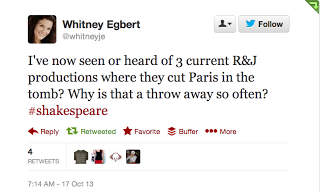Loyal followers of Shakespeare Geek know what’s coming. Ever since my children were old enough to go to school, I have taken the early year “parent teacher conference” as an opportunity to volunteer to bring some form of Shakespeare content to the classroom, adjusted for whatever age we’re working with. I’ve read a children’s version of The Tempest to first graders, I’ve done recitation with the Brownies, I’ve done sonnets with the fifth graders and last year we did Midsummer Night’s Dream with the third graders.
This year I’ve got a second grader (7yr old boy) and a fourth grader (9yr old girl and veteran of Midsummer).
How’d it go?
Second grade teacher loves the idea, and in fact brings up the idea of fairy tales as inspiration for modern literature. Which I find an absolutely fascinating coincidence because in a future post I’ve got a book that claims to be a collection of fairy tales that inspired Shakespeare. Perfect fit! I can come in, read one of the fairy tales, and talk about the parallels to Shakespeare’s story. Works for me.
Fourth grade teacher, while admitting her own weakness in the realm of Shakespeare, is also chomping at the bit to try it. Her idea was to go more down the path of biography (something I’ve always wanted to tackle and not done yet) which fits in with her class’s existing book report schedule, where their second book must be a biography. She suggested that as a special guest I can come in and do a presentation on Shakespeare’s biography. Sounds good to me!
So it looks like it’ll be showtime for me again at least twice this year. My oldest is now in middle school where the rules about parent volunteers are entirely different, so I have no idea whether I’ll be able to get in there at all. But if the opportunity presents itself I will try!
I told the teachers today, “I know that the high school actually has a very good Shakespeare program. What I’m hoping is to create this wave of children back in elementary school that have already got enough Shakespeare experience that when they get to high school and are “introduced” to the topic officially they’ll all be, “No problem, we got this,” and the teachers in charge of that program will be left wondering, “Wait, what just happened?”


